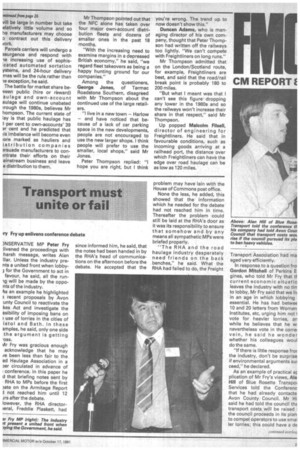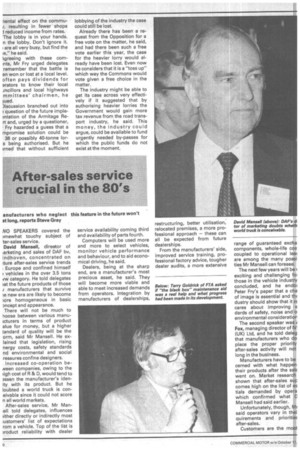TY Fry up enlivens conference debate )NSERVATIVE MP Peter Fry
Page 21

Page 22

If you've noticed an error in this article please click here to report it so we can fix it.
livened the proceedings with harsh message, writes Alan liar. Unless the industry prents a united front when lobby] for the Government to act in favour, he said, all the runig will be made by the opponts of the industry.
4s an example he highlighted ?. recent proposals by Avon unty Council to reactivate the kes Act and investigate the ssibility of imposing bans on use of lorries in the cities of istol and Bath. In these 3mples, he said, only one side the argument is getting loss.
Or Fry was gracious enough acknowledge that he may re been less than fair to the ad Haulage Association in a aer circulated in advance of conference. In this paper he d that briefing notes sent by RHA to MPs before the first )ate on the Armitage Report I not reached him until 12 rs after the debate.
lowever, the RHA directorieral, Freddie Plaskett, had since informed him, he said, that the notes had been handed in by the RHA's head of communications on the afternoon before the debate. He accepted that the problem may have lain with the House of Commons post office.
None the less, he added, this showed that the information which he needed for the debate had not reached him in time. Thereafter the problem could still be laid at the RHA's door as it was its responsibility to ensure that somehow and by any means all sympathetic MPs were briefed properly.
"The RHA and the road haulage industry desperately need friends on the back benches," he said. What the RHA had failed to do, the Freight Transport Association had ma aged very efficiently.
In response to a question fro Gordon Mitchell of Perkins E gines, who told Mr Fry that if current economic situatio leaves the industry with no tirr to lobby, Mr Fry said that we I iN in an age in which lobbying essential. He has had betweE 10 and 20 letters from Women Institutes, etc, urging him not 1 vote for heavier lorries, an while he believes that he w nevertheless vote in the correl vein, he said he wonder whether his colleagues woul do the same.
"If there is little response fror the industry, don't be surprise if environmental arguments sui ceed," he declared.
As an example of practical ar plication of Mr Fry's views, Ala Hill of Blue Rosette Transpoi Services told the Conferenc that he had already contacte Avon County Council. Mr Hi said he had told the council thE transport costs will be raised the council proceeds in its plan to compel operators to use smal ler lorries; this could have a de rental effect on the commui, resulting in fewer shops reduced income from rates. The lobby is in your hands. n the lobby. Don't ignore it. are all very busy, but find the le," he said.
kgreeing with these cornnts, Mr Fry urged delegates. remember that the battle is en won or lost at a local level. often pays dividends for orators to know their local incillors and local highways mmittees' chairmen, he jued.
)iscussion branched out into question of the future implemtation of the Armitage Rert and, urged by a questioner, • Fry hazarded a guess that a mpromise solution could be 38 or possibly 40-tonne fors being authorised. But he irned that without sufficient lobbying of the industry the case could still be lost.
Already there has been a request from the Opposition for a free vote on the matter, he said, and had there been such a free vote earlier this year, the case for the heavier lorry would already have been lost. Even now he considers that it is a "toss up" which way the Commons would vote given a free choice in the matter.
The industry might be able to get its case across very effectively if it suggested that by authorising heavier lorries the Government would gain more tax revenue from the road transport industry, he said. This money, the industry could argue, could be available to fund urgently needed by-passes for which the public funds do not exist at the moment.








































